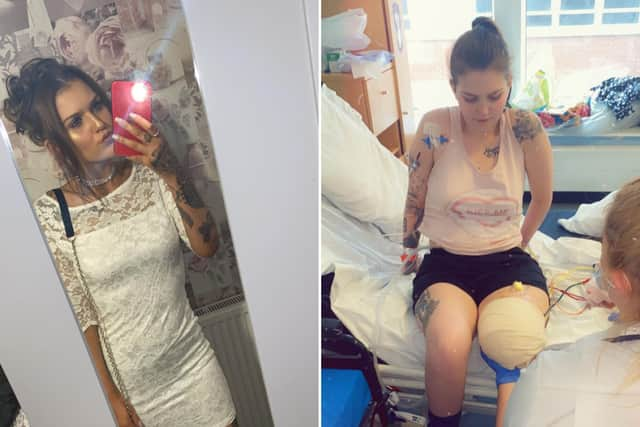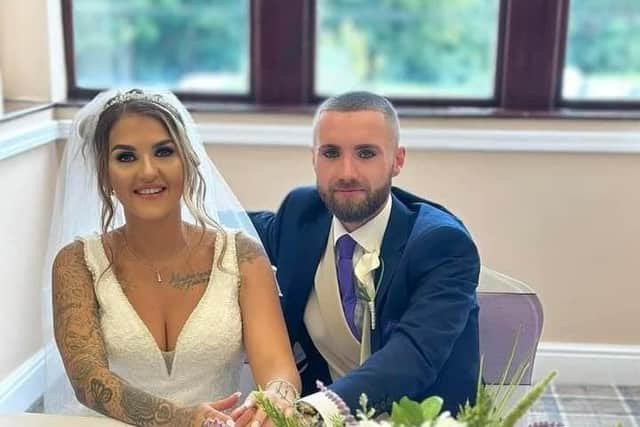'Extremely active' woman has leg amputated after waiting 16 hours for surgery on blood clot
Molly Harbron was 22 when she went into Dewsbury and District Hospital’s A&E department in April 2020 concerned her left leg and foot were numb and cold, her left foot was discoloured and she had calf pain. Molly, of Batley, had a history of diabetic ketoacidosis, a serious complication of diabetes, the side-effects of which can include blood clots.
Staff at the hospital failed to carry out adequate tests and despite health bosses admitting she should have had surgery by 9pm that same day, she wasn’t operated on until 1.30pm the following day.
Advertisement
Hide AdAdvertisement
Hide AdSurgeons were unable to restore blood flow to her lower left leg. She initially underwent a below the knee amputation, but days later had to have surgery to amputate her leg above the knee.


Molly, who has since had to give up her job as a carer, said: “Before all this I was extremely active. I worked in a quite physically demanding job and enjoyed going out with my friends, shopping and all of the things people my age do.
“However, that’s all completely gone. It’s sometimes difficult to find the words to describe how my life has changed. It’s not just the physical injuries which have been hard to come to terms with but also the psychological impact.
“I went from being quite independent to reliant on others. I do have a prosthetic leg but it’s not specifically designed for me. I suffer walking any kind of distance and I suffer with pain when using it so I tend to use a wheelchair.”
Advertisement
Hide AdAdvertisement
Hide AdHowever Molly, who is now 25, managed to stand on her wedding day when she married fiance Daniel, also 25, in August last year.


Molly added: “We’d been planning our wedding for months and had everything set out how we had dreamed. After everything I’d been through I was determined I wasn’t going to let it dictate my wedding.
“Daniel is the most wonderful and caring person whose support, along with the support of my family, have really helped me over the last few years. I can’t thank them enough for everything they continue to do for me.
“While I try not to think about how life has changed, it’s difficult. I know I have a long way to go and face many challenges, but now having answers regarding what went wrong in my care means I can try and focus on my rehabilitation.
Advertisement
Hide AdAdvertisement
Hide Ad“This never should have happened so I just hope that by speaking out I can prevent it happening to someone else.”
Molly was diagnosed with diabetic ketoacidosis and admitted to ward just after 7.30pm. Around 30 minutes later a review suspected she had a deep vein thrombosis. Following a further review, doctors concerned about the blood flow to her lower left leg called another hospital for an opinion.
A radiology report at 11.30pm suggested Molly had blood clots and a blocked artery behind her left knee. She was transferred to another hospital and was in theatre for surgery just after 1.30pm the following day.
She had below the knee amputation on the day after, and then above the knee amputation a further week later as she continued to have issues. She also spent a further 18 days in hospital while recovering.
Advertisement
Hide AdAdvertisement
Hide AdShe has since instructed Irwin Mitchell to investigate her care under Mid Yorkshire Teaching NHS Trust, which runs Dewsbury and District Hospital. The Trust admitted a breach of duty and apologised to Molly.
If it was not for the breach of duty, Molly would – “on the balance of probabilities” – not had to have had the amputation at all.
Ashlee Coates, the specialist medical negligence lawyer at Irwin Mitchell representing Molly, said: “The last few years and coming to terms with the avoidable and life-changing consequences of Molly’s amputation have understandably been extremely difficult for her and her family.“What happened to her vividly highlights the repercussions of what can happen when patient care falls below expected standards.“While nothing can make up for the physical and psychological trauma Molly has experienced, we’re determined to ensure she can access the specialist care and therapies she needs to continue her recovery and live as independently as possible. In the meantime it’s vital that lessons are learned to improve patient safety for others.”
During legal proceedings the Trust admitted it failed to carry out a number of tests, including examining and comparing pulses, recording and comparing Molly’s leg temperatures and examining the blood supply to her left foot. The Trust did not query whether she had reduced blood supply to her leg and did not refer her to the vascular surgery department.
Advertisement
Hide AdAdvertisement
Hide AdRichard Robinson, Chief Medical Officer at the Mid Yorkshire Teaching NHS Trust said: “We aim to ensure all patients get the right diagnosis and the treatment they need to get better. In Mrs Harbron’s case that did not happen and for that I am sincerely sorry. Patient safety and achieving the best treatment results is a priority for us and we work continuously to improve.”
Comment Guidelines
National World encourages reader discussion on our stories. User feedback, insights and back-and-forth exchanges add a rich layer of context to reporting. Please review our Community Guidelines before commenting.
